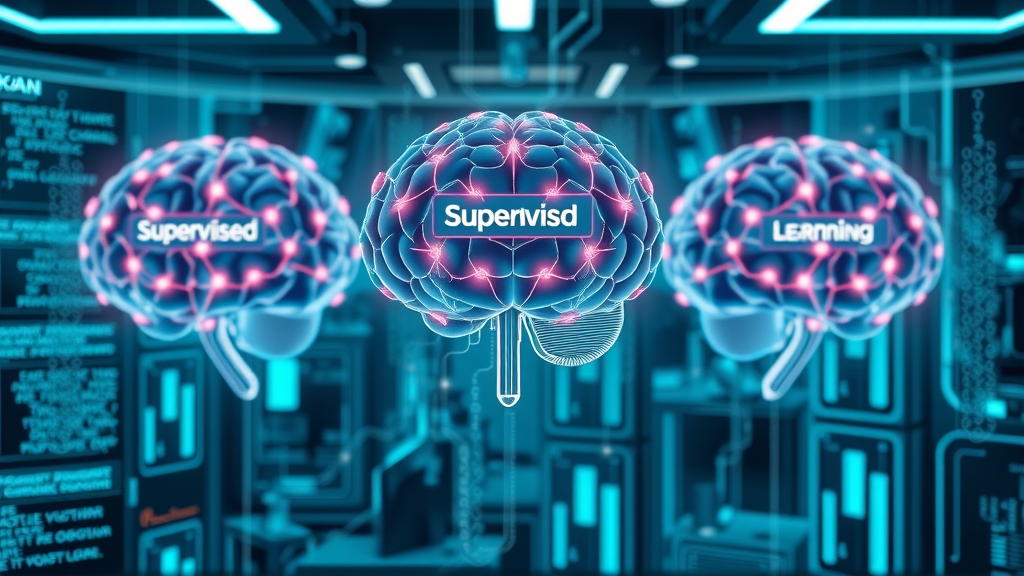Imagine achieving up to 30% better ROI simply by adopting advanced technology in your marketing strategies. Machine learning in marketing isn’t just a buzzword—it’s a transformative force reshaping digital marketing, empowering brands with actionable data and predictive power. In this article, you’ll discover how the smartest companies are turning numbers into opportunities, outpacing competitors, and ushering in a new era of intelligent decision-making.
From practical examples to industry-leading case studies, we’ll guide you step-by-step through everything you need to know about using machine learning models to optimize your marketing campaigns and unlock the true potential of your marketing spend.
The Transformative Power of Machine Learning in Marketing: A Statistical Perspective
- Recent research reveals that companies leveraging machine learning in marketing report up to 30% better ROI than their competitors—a game changer for modern digital marketing strategies.

Businesses are rapidly realizing the transformative power of machine learning in marketing . According to current industry data, organizations embracing machine learning technology can achieve ROI increases of up to 30% compared to their peers. This significant uplift stems from machine learning’s ability to process massive volumes of customer data , uncover trends, predict outcomes, and automate decision-making faster and more accurately than ever before. By embedding learning algorithms across the marketing funnel, companies become more precise in targeting, streamline marketing campaigns , and adapt strategies in real-time—all of which drive improved conversion rates and higher customer engagement. Such results signal a paradigm shift in how brands formulate their marketing strategies, with data science and predictive analytics cementing their place at the heart of high-performance digital campaigns.
Not only does the integration of machine learning in marketing offer a measurable advantage in terms of returns, but it also introduces scalability and efficiency that traditional marketing analytics can’t match. Digital marketing teams can track ever-evolving consumer preferences, test new approaches using learning models , and iterate campaign elements at unprecedented speed—confident in the knowledge that their actions are powered by robust, up-to-the-minute insights.
Understanding Machine Learning in Marketing and Its Impact on Digital Marketing
- Define machine learning in marketing and discuss its growing role within digital marketing. Highlight statistics on adoption across industries.
- Explain how machine learning enhances marketing strategies and acts as a catalyst for successful marketing campaigns.
Machine learning in marketing refers to the application of computer algorithms that automatically improve through experience and data analysis to optimize marketing decisions. Essentially, these learning models examine patterns in customer data —from purchase history and browsing behavior to engagement rates on different platforms—and learn how to predict future behaviors, segment audiences, and even personalize content in real time. Research shows that over 63% of top-performing organizations in the digital marketing industry have already integrated some form of machine learning or artificial intelligence into their workflow, with adoption expected to accelerate rapidly in the years ahead.
The impact of machine learning on digital marketing is profound. By automating labor-intensive processes such as customer segmentation and campaign optimization, marketing teams can shift their focus from manual data analysis to strategy and creativity. Predictive analytics models allow for smarter resource allocation and precise targeting, simultaneously increasing efficiency and delivering more relevant, engaging content to the brand’s target audience. As the operational backbone for today’s most successful campaigns, machine learning is quickly earned a reputation as the ultimate catalyst for marketing strategies that consistently outperform the competition.
Key Concepts: Core Machine Learning Models Used in Marketing
- Differentiate between supervised, unsupervised, and reinforcement learning models as applied to marketing.

There are three principal categories of machine learning models that dominate the digital marketing landscape: supervised learning , unsupervised learning , and reinforcement learning . Supervised learning involves training algorithms with historical data labeled by outcomes, such as which customers converted after receiving a specific email. This approach powers many predictive analytics tools, including conversion rate forecasting and churn prediction. Unsupervised learning , in contrast, explores customer data without predefined labels, extracting hidden patterns, clustering audiences based on similarities, and enabling advanced customer segmentation that marketers may not have considered. Finally, reinforcement learning mimics a trial-and-error approach, using ongoing feedback from marketing campaign performance to continually optimize tactics in search engines, content placement, or ad bidding.
For example, a data science team may deploy supervised learning to predict which segments are more likely to redeem a seasonal offer, while unsupervised techniques might uncover new audience clusters ripe for targeted promotions. Reinforcement learning, popular in programmatic advertising, enables platforms to adapt bidding strategies on the fly for optimal results, dynamically maximizing ROI based on evolving metrics and real-time feedback.
- Showcase real-world examples of machine learning models driving marketing campaigns and improving customer segmentation.
Many marketing campaigns now harness these models for tangible results. Streaming services, for instance, use unsupervised learning to recommend shows to subscribers based on watch history, while ecommerce brands deploy supervised models to automate recommendations and increase conversion rates . Reinforcement learning is revolutionizing paid ad placement by automatically raising or lowering bids to increase ad visibility among profitable audiences.
Machine Learning in Digital Marketing: How Leading Brands Gain Competitive Advantage
- Analyze leading digital marketing campaigns that implemented machine learning to boost performance, identify patterns, and personalize outreach.
- Summarize how artificial intelligence and predictive analytics reshape the digital marketing environment.

The world’s most successful brands are leveraging machine learning in marketing to identify intricate trends across broad data sets, from social media engagement to transactional records. Leading companies—think major retailers or global banks—embed artificial intelligence and predictive analytics into their digital marketing frameworks to not only identify the right audiences, but deliver hyper-personalized content and offers in the perfect moment. For example, an airline might adjust pricing and promotions in real time based on booking patterns, weather, and market demand—all thanks to the robust data analysis capabilities fueled by machine learning.
Beyond targeting, machine learning models drive major leaps in campaign optimization. They determine which channels or messages yield the highest engagement, adapt budget allocations accordingly, and automate the tedious A/B testing process. With every iteration, these learning models get smarter, offering digital marketers an ever-evolving toolkit that boosts efficiency and keeps their strategies ahead of the curve.
The ripple effect is a fundamental reshaping of the digital marketing environment. With real-time insights, automated personalization, and the predictive power of artificial intelligence, marketers can now operate with unprecedented agility and precision. No longer is marketing about guesswork—it’s about clear, data-driven action and innovation.
Customer Segmentation and Personalization: Machine Learning in Action
- Describe how machine learning automates customer segmentation for highly personalized marketing campaigns.
- Discuss the effect of data analysis and predictive analytics on customer satisfaction and engagement.

Automated customer segmentation stands out as one of the most profitable uses of machine learning in marketing. By analyzing historical data including purchase history , engagement frequency, and product interaction, learning algorithms organize customers into distinct, actionable groups. This automation enables marketers to target segments with pinpoint accuracy—improving both customer engagement and marketing ROI without manual labor. As a result, personalized marketing campaigns become not just scalable but consistently effective, reaching the right audience with offers that genuinely resonate.
The effect is clear: brands see dramatic improvements in customer experience and customer satisfaction . With ongoing data analysis and predictive analytics, companies can ensure every touchpoint is tailored. Customers that feel understood and valued are more likely to convert, advocate, and remain loyal, creating a virtuous cycle where deeper insights drive stronger marketing strategies, and vice versa.
As consumers expect ever more custom-fit content, machine learning provides the analytical muscle for ongoing improvement, allowing digital marketers to adjust and adapt before the customer even realizes their needs have changed.
Optimizing Marketing Campaigns with Machine Learning-Driven Data Analysis
- Showcase the cycle of data collection, analysis, and campaign optimization using machine learning in marketing.
- Breakdown the integration of data science, learning models, and machine learning models in continuously improving ROI.

Machine learning in marketing thrives on the interplay of data science , continuous data collection, and the flexibility of learning models. The cycle begins with marketers gathering detailed interaction data from websites, emails, advertising, and social platforms. This raw data is then analyzed by machine learning algorithms that transform millions of touchpoints into patterns, indicators, and actionable recommendations. For instance, predictive analytics might spot that users who click on a certain ad sequence are 40% more likely to buy.
With these insights, marketing teams can rapidly optimize campaigns—refining messaging, shifting spend, or targeting new audiences—with confidence. The seamless marriage of machine learning models and data science ensures each campaign not only reflects past performance but predicts future outcomes for superior ROI. Over time, every marketing action adds to a virtuous cycle: more data powers more accurate models, which enables better results and more intelligent marketing strategies.
The result? Marketers move from intuition to evidence-based decisions, capitalizing on opportunities as they arise and making split-second adjustments that maximize results across every touchpoint.
Case Study: Email Marketing Enhanced by Machine Learning
- Analyze how machine learning algorithms increase email marketing open rates and conversions through hyper-targeted messaging.
- Examples of customer engagement improvement via data-driven email campaigns.

Take email marketing , a channel where open and conversion rates have traditionally lagged due to generic messaging. With machine learning, brands can now analyze historical data on click-throughs, engagement times, and purchase behavior to determine exactly which content resonates with different groups. Sophisticated learning algorithms personalize subject lines, send times, and even the core offer for each recipient, dramatically increasing both the likelihood of an open and the probability of a conversion.
Consider a leading retailer that used a machine learning model to segment its email list based on previous buying patterns and website activity. Targeted messaging led to a 45% surge in click rates and a 25% increase in conversion rates compared to past email marketing campaigns. The shift to data-driven decisions doesn’t just improve metrics on a dashboard—it boosts actual customer engagement , opens new avenues for product cross-sells, and drives long-term loyalty.
This success highlights the practical value of integrating email marketing with machine learning in marketing initiatives. Automated optimization frees up creative marketing teams to craft compelling experiences, while machine learning algorithms do the heavy lifting in the background—delivering measurable gains with every send.
Artificial Intelligence, Predictive Analytics, and the Future of Customer Experience in Marketing
- Interpret the relationship between artificial intelligence, machine learning, and predictive analytics in shaping superior customer experience.
- Demonstrate how marketers can build proactive campaigns that anticipate customer needs and boost satisfaction.

The synergy between artificial intelligence , machine learning , and predictive analytics is revolutionizing customer experience . Machine learning serves as the analytical engine, processing vast quantities of customer data to uncover patterns, while AI interfaces (such as chatbots or recommendation engines) deliver those results in intuitive, human-centric ways. Predictive analytics takes it a step further, forecasting future behaviors such as churn risk, conversion propensity, or upsell opportunities—enabling marketers to intervene proactively.
With these tools, marketers don’t just respond to evolving customer needs—they anticipate them. Campaigns powered by these models offer tailored suggestions the moment someone lands on your site or interacts via email. This level of proactive personalization boosts customer satisfaction and strengthens brand loyalty , setting a new standard for customer experience in the digital age.
| Aspect | Traditional Marketing Strategies | Machine Learning in Marketing |
|---|---|---|
| Audience Targeting | Broad, manual segmentation | Automated, granular segmentation with real-time adjustments |
| Data Analysis | Retrospective, often slow | Real-time, continuous, predictive analytics |
| Personalization | Static, rule-based | Dynamic, individual-focused recommendations |
| ROI Optimization | Occasional reporting & static A/B testing | Continuous, automated optimization and rapid adaptation |
Real-World Impact: How Top Brands Leverage Machine Learning in Marketing
- Profile brands like Coca-Cola utilizing AI and machine learning in digital marketing to improve campaign optimization and customer segmentation.

Industry leaders exemplify what’s possible when machine learning in marketing is deployed at scale. Coca-Cola, for example, harnesses artificial intelligence and learning algorithms to analyze millions of data points from social media, sales, and customer feedback. This real-time digital intelligence enables them to predict purchase trends, optimize offer timing, and adapt campaigns dynamically to current consumer sentiment.
The company’s global marketing approach incorporates advanced data science and predictive analytics to segment audiences not just by demographics but by real behaviors and interests. This has led to more engaging content, smarter ad placements, and higher ROI across international borders. The lesson is clear: top brands are not just using technology—they’re turning data into a strategic asset, redefining marketing campaigns with the power of machine learning models.
"Data is the new oil, and machine learning is the engine transforming it into actionable insights for marketers."
Implementing Machine Learning in Marketing: Step-by-Step Roadmap
- Identify goals and key metrics for ROI improvement.
- Audit data readiness for machine learning integration.
- Select the appropriate machine learning model or partner.
- Deploy, test, and iterate learning models for continued marketing performance.

To unlock the ROI potential of machine learning in marketing , follow a structured approach. First, set clear objectives—whether that’s increasing customer engagement , boosting conversions, or maximizing customer satisfaction . Assess your data infrastructure to ensure you have high-quality, relevant, and accessible data ready for analysis. Next, choose or build the right machine learning model based on your campaign goals and company resources; in some cases, partnering with expert agencies accelerates results. Finally, launch your solution, monitor performance, and continuously iterate—successful machine learning relies on ongoing tweaking and real-world feedback to optimize digital marketing campaigns for the best possible ROI.
Investment in team training, cross-department collaboration, and technology partners simplifies deployment and ensures the long-term success of marketing strategies powered by AI and learning models.
Common Challenges When Adopting Machine Learning in Marketing—And How to Overcome Them
- Discuss practical obstacles: data quality, privacy concerns, and talent gaps in digital marketing environments.
- Checklist: Best practices for machine learning adoption across marketing strategies.
While the case for machine learning in marketing is compelling, adoption presents real-world challenges. Many marketers struggle with data quality issues—disconnected systems, missing data, or inconsistent formatting undermining the accuracy of predictive models. Privacy concerns must also be addressed, ensuring compliance with regulations like GDPR and building trust with customers around data collection and usage. Finally, the talent gap is significant: digital marketing teams may lack experience in data science , machine learning, or advanced analytics.
Overcoming these challenges requires a proactive approach:
- Ensure robust data governance and hygiene practices are in place.
- Invest in upskilling internal teams through training and partnerships with data science experts.
- Be transparent with customers about data practices and consistently monitor for new privacy requirements.
- Choose user-friendly learning models or external partners that lower the barrier to entry for machine learning in marketing projects.
Maximizing ROI: Measuring Performance and Success with Machine Learning in Marketing
- Key metrics: customer engagement, customer satisfaction, campaign efficiency, and sales lift as influenced by machine learning.

The ROI of machine learning in marketing is best captured through a blend of classic and advanced metrics. These include quantifiable gains in customer engagement and satisfaction, improved campaign efficiency , and measurable sales lift. Marketers should monitor changes in conversion rates , campaign ROI, repeat purchases, and customer sentiment, as these KPIs highlight both the financial and experiential impact of machine learning models.
Integrating a robust measurement framework ensures continuous improvement:
- Track success rates for personalized campaigns versus standard efforts.
- Analyze customer feedback and behavioral shifts post-implementation of AI-driven marketing campaigns.
- Regularly review automation and optimization savings in campaign management time and budget allocation.
| Metric | Pre-ML Implementation | Post-ML Implementation | Target Improvement (%) |
|---|---|---|---|
| Email Open Rate | 15% | 21% | +40% |
| Campaign Conversion Rate | 3.5% | 5.0% | +43% |
| Customer Churn | 7% | 5.2% | -26% |
| Time to Optimize Campaign | 3 Weeks | 3 Days | -86% |
Unlocking New Marketing Strategies Through Machine Learning Innovation
- Emergent marketing strategies made possible by artificial intelligence, predictive analytics, and advanced machine learning models.
- Future trends: how automation, customer segmentation, and data analysis will continue to shape the next decade of digital marketing.
The evolution of machine learning in marketing is unveiling strategies that were unthinkable just a few years ago. Real-time personalization at scale, predictive product recommendations, automated media buys, and dynamic price optimization are now essential components of modern marketing arsenals. Artificial intelligence sifts through fast-changing market signals, allowing marketers to retarget audiences instantly and uncover opportunities that would have otherwise gone unnoticed.
Looking to the future, trends such as automated content generation, conversational marketing powered by natural language processing, and seamless omnichannel experiences will continue to redefine the marketing landscape. Marketers who champion machine learning models and predictive analytics today will enjoy a distinct competitive edge—increasing both their organizational agility and their ability to deliver truly memorable customer experiences.
What You'll Gain by Integrating Machine Learning in Marketing
- Condensed benefits: improved decision making, personalized campaigns, higher customer engagement, superior ROI, and a smarter marketing strategy.
Integrating machine learning in marketing means unlocking a toolkit for smarter, faster, and more effective marketing decision making. Enjoy sharper insights from your data, personalize every stage of the customer journey, drive up customer engagement and satisfaction, and consistently squeeze more value from your marketing budget. Ultimately, you’ll equip your business with adaptive strategies and the agility to outperform the competition—no matter how fast the digital landscape shifts.
These gains apply whether you’re a startup or a global brand: more meaningful interactions, measurable ROI improvement, and the confidence to lead your market through data-driven innovation.
Key Industry Use Cases: Success Stories in Machine Learning and Digital Marketing
- Highlight relevant examples from industries such as retail, finance, technology, and entertainment.
Retail: Major ecommerce platforms like Amazon use machine learning to power real-time recommendations, driving sales and improving customer loyalty.
Finance: Leading banks employ predictive analytics to segment audiences for targeted lending campaigns, while also using AI-powered chatbots to boost customer satisfaction and decrease service costs.
Technology: Software companies tailor onboarding experiences using learning models that adapt based on user activity, optimizing free trial conversions.
Entertainment: Streaming giants leverage customer data to personalize content suggestions, keeping users engaged and reducing churn through machine learning-driven customer segmentation .
These cases show how machine learning in marketing isn’t industry-specific—it’s a universal driver of better experiences and business results.
Frequently Asked Questions About Machine Learning in Marketing
- What is machine learning in marketing? Machine learning in marketing refers to using computer models that learn from data to automate and optimize marketing processes, such as customer segmentation, targeting, and campaign optimization for better ROI.
- How does machine learning improve customer segmentation? Machine learning algorithms analyze large sets of data—such as purchase history and browsing behavior—to automatically group customers into actionable segments, increasing targeting precision and campaign relevance.
- Which marketing strategies benefit most from machine learning models? Strategies including email marketing, dynamic ad targeting, personalized content, and churn prevention see significant improvements from machine learning models because of increased automation and predictive accuracy.
- How quickly can businesses see ROI using machine learning in marketing? Depending on data quality and strategy, many businesses observe measurable ROI improvements within three to six months of implementing machine learning in their marketing campaigns.
People Also Ask: How can machine learning be used in marketing?
- Machine learning in marketing enables predictive analytics, automated optimization of marketing campaigns, real-time personalization, improved customer segmentation, and efficient data analysis. Brands benefit by targeting the right audience, at the right time, with tailored content.
People Also Ask: How does Coca-Cola use AI in marketing?
- Coca-Cola leverages AI and machine learning in digital marketing to analyze vast consumer data, predict purchase behavior, optimize marketing campaigns in real-time, and generate personalized customer experiences.
People Also Ask: What does ML mean in marketing?
- ML, or machine learning, in marketing refers to algorithms and models that analyze data, learn from patterns, and automate decision-making to optimize marketing strategies and boost ROI.
People Also Ask: Can I use AI for marketing?
- Absolutely. Businesses of all sizes can harness AI and machine learning in marketing for customer segmentation, predictive analytics, campaign automation, and enhancing both efficiency and results.
Action Steps for Marketers Ready to Transform ROI with Machine Learning
- Assess your current marketing technologies for data readiness and integration capability.
- Invest in employee training and cross-skilling on data science, analytics, and machine learning models.
- Partner with data scientists, external agencies, or platform vendors to accelerate deployment and knowledge transfer.
- Launch a pilot machine learning initiative targeting a key marketing campaign, validate with strict KPIs, and evolve toward organization-wide transformation.
By taking a measured, skills-focused approach, companies can lay the groundwork for long-term success and sustainable marketing innovation powered by machine learning.
In Summary: The Unstoppable Revolution of Machine Learning in Marketing
- Don’t wait—capitalize on the ROI potential and transformative power of machine learning in digital marketing. Act now, and future-proof your marketing strategies with smarter, data-driven innovation.
Integrating machine learning into marketing strategies can significantly enhance return on investment (ROI) by enabling more precise customer segmentation, personalized recommendations, and predictive analytics. For instance, Starbucks has leveraged predictive analytics to deliver hyper-personalized offers through its mobile app, resulting in a tripling of marketing effectiveness and a 2-3x increase in incremental spend compared to traditional targeting methods. ( 33rdsquare.com ) Similarly, The Home Depot employs machine learning to tailor product content and recommendations across various channels, leading to a 15-20% increase in revenue per email sent and a 25% boost in return on ad spend for retargeting campaigns. ( 33rdsquare.com ) These examples underscore the transformative potential of machine learning in optimizing marketing efforts and driving substantial business growth.
 Add Row
Add Row  Add
Add 






Write A Comment